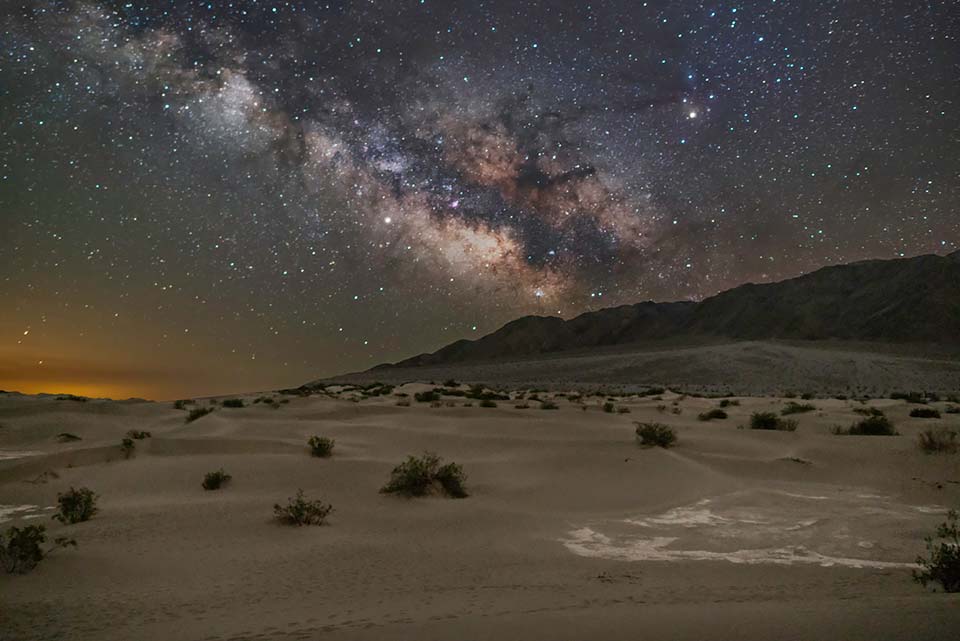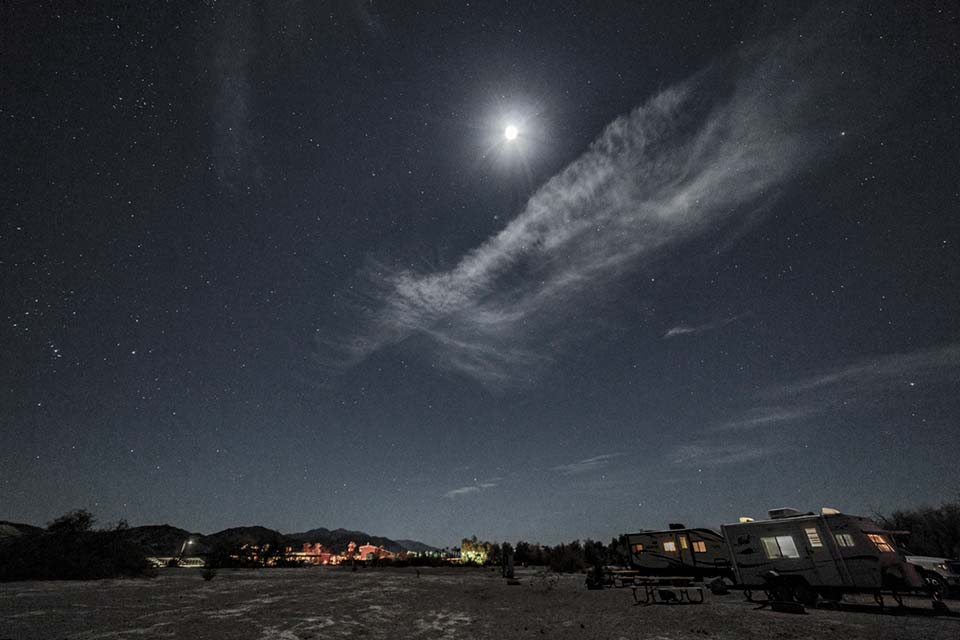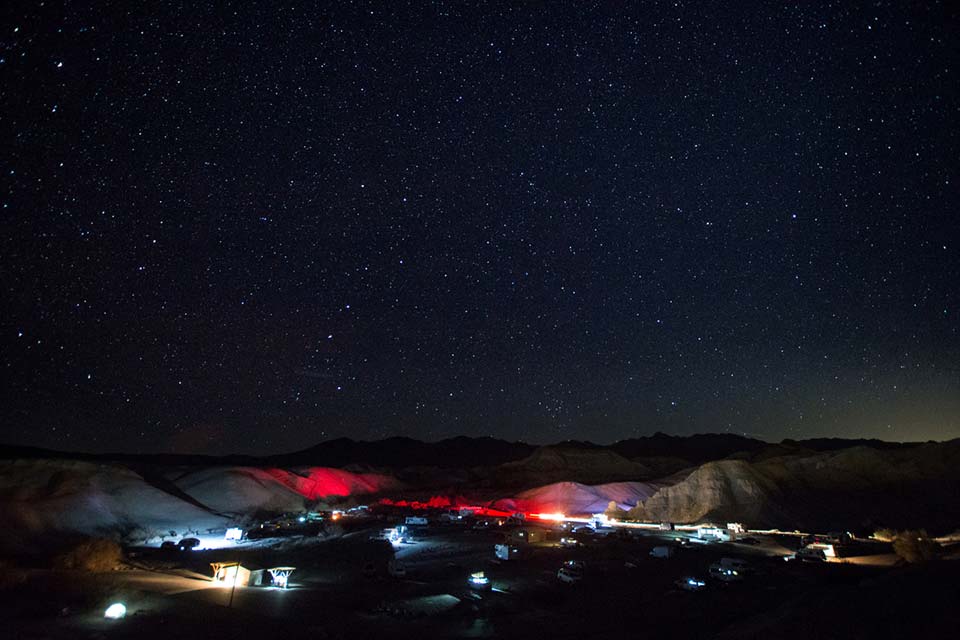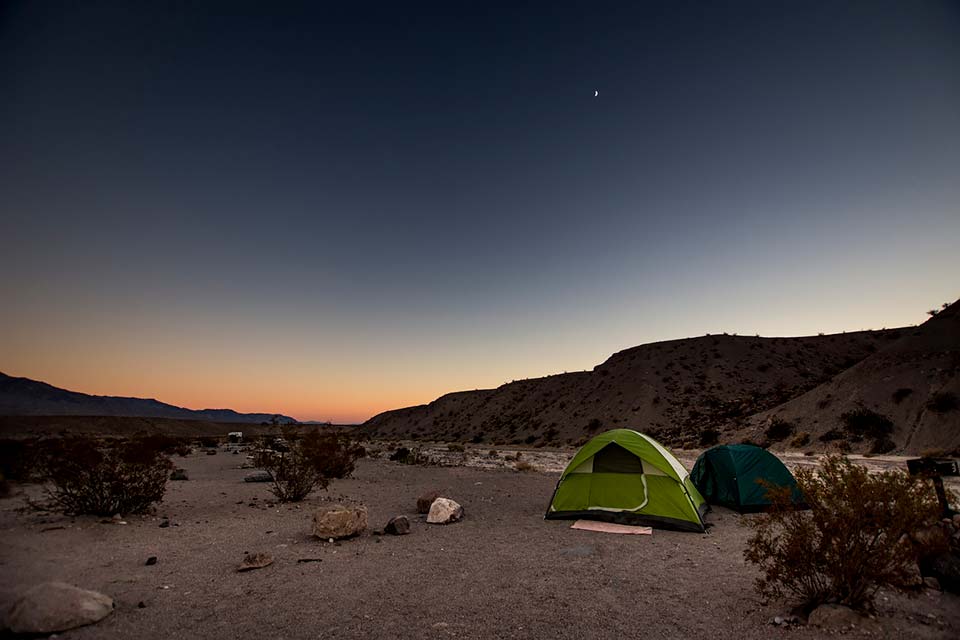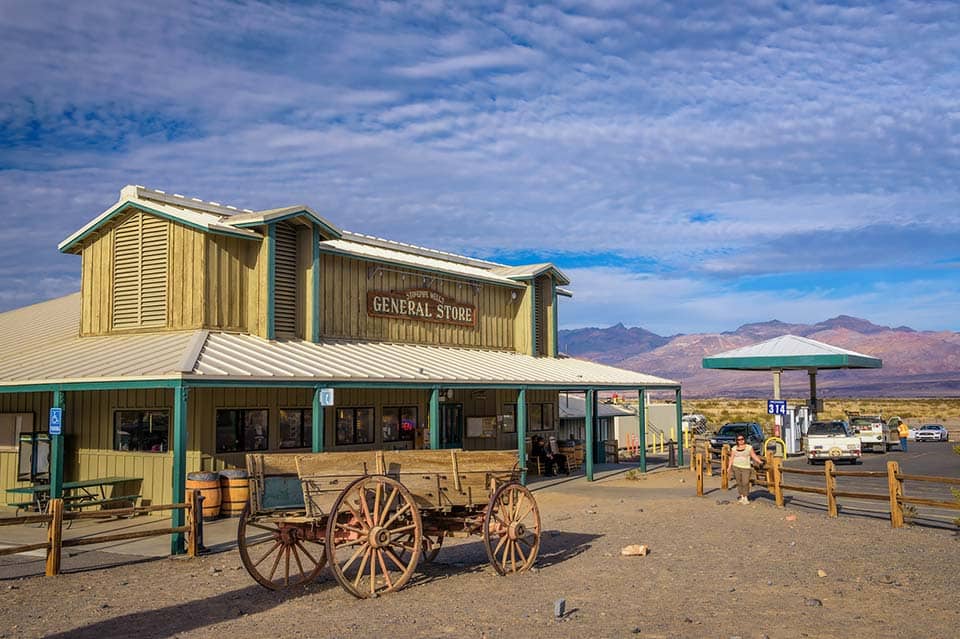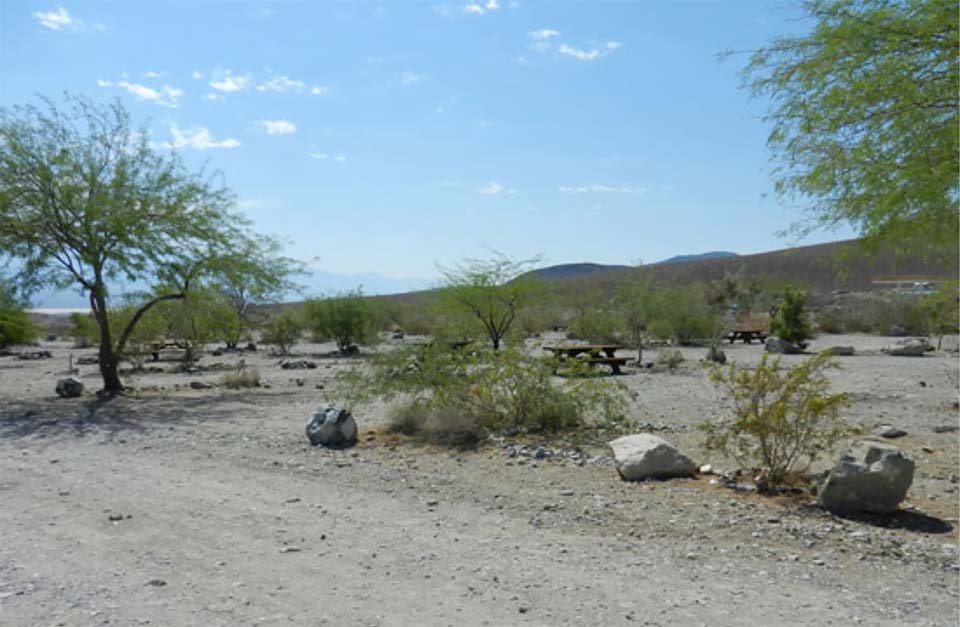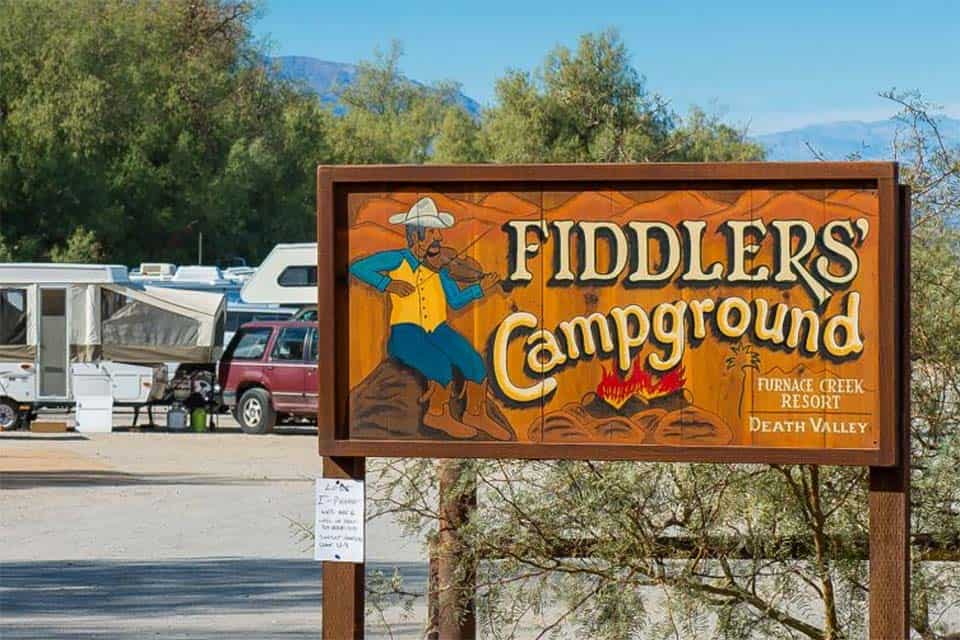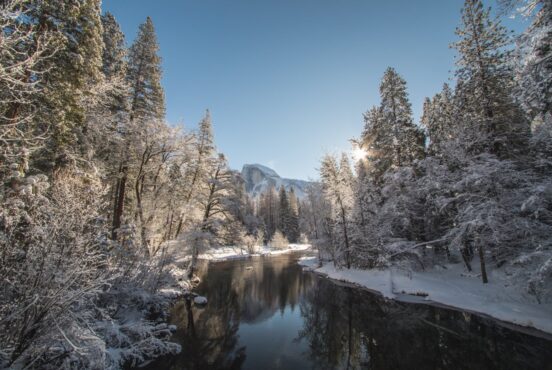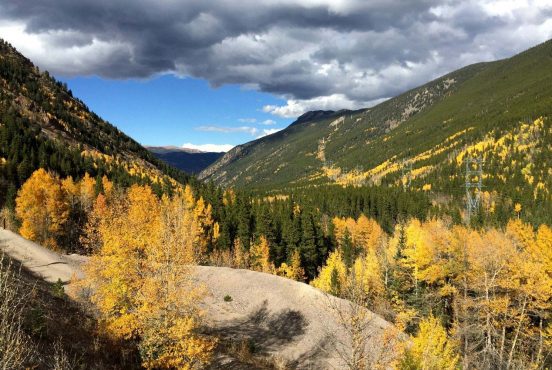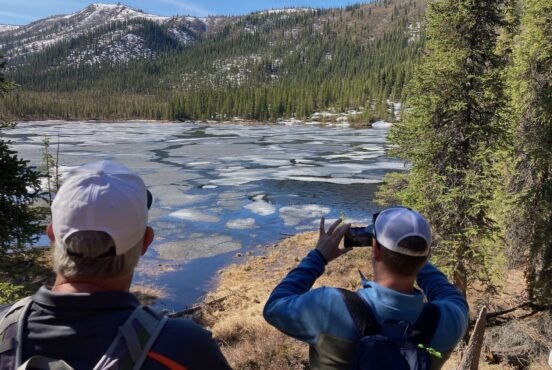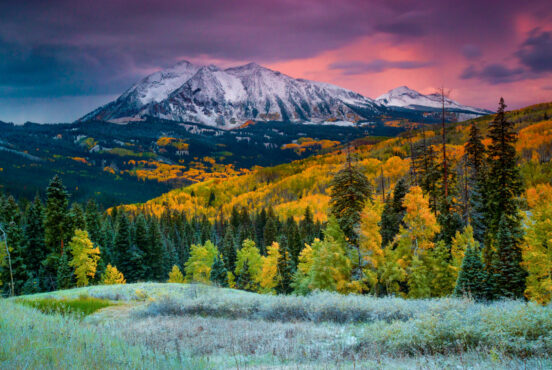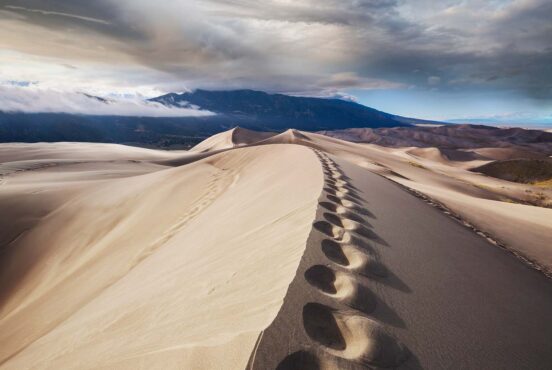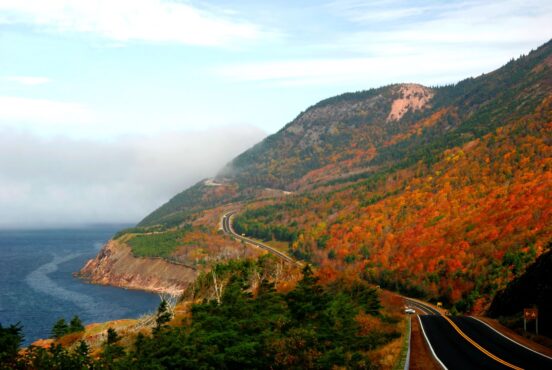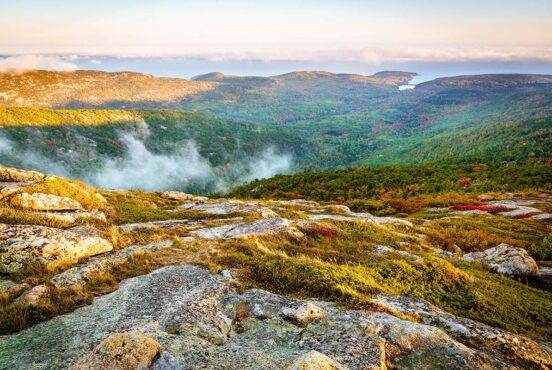Don’t let the morbid name deter you — Death Valley is actually a spellbinding camping destination. As long as you stick to prime season camping or head to a high-elevation campground, you’ll rarely be able to tell you’re in the hottest desert in the United States.
Death Valley National Park is a land of extremes, a cacophony of colorful badlands and harsh, desert geology. It’s an arid wonderland and a park of superlatives — the hottest, lowest, and driest place in the United States. It’s also the largest National Park in the lower 48.
Whether you’re a zealous desert advocate or simply passing through central California, Death Valley is certainly one of the strangest National Parks out there — and well worth a camping trip.
Related Read: 12 Ideas for How to Spend One Day in Death Valley National Park
About Death Valley
Due to its extremely remote location, Death Valley is known as a dark sky park. It’s miles from any large city, making it a phenomenal place to scope out constellations or try your hand at capturing the Milky Way. There’s a reason SETI (the Search for Extra Terrestrial Intelligence) is nearby — there’s nothing out there but the wide open expanse of the desert.
Death Valley is also huge. In most other National Parks, you’ll be able to get from trail to trail in under an hour. In contrast, many of the attractions found here are quite a haul to get to — especially if you’re camping in the cooler, higher elevations near Telescope Peak. You’ll need to plan accordingly, bring some epic playlists, and pack plenty of water.
Considering the extreme temperatures in Death Valley, most campgrounds do not offer summer reservations. Even nighttime temperatures can stay above 100 degrees Fahrenheit, making the park a bad choice for a summer vacation.
The good news is that with an abundance of sites to camp in, the campgrounds rarely fill up outside of holiday weekends in the spring and fall. Most campgrounds offer large, flat sites, making this an absolute haven for anyone with an RV or trailer.
It’s worth mentioning that this is the desert, so foraging for firewood is prohibited (and darn near impossible). Campers should buy their wood at one of the nearby general stores before proceeding to their campsite. This helps protect the fragile, desert ecosystem and ensures that imported wood from outside sources doesn’t bring harmful insects or plant disease into the park.
It’s a great choose-your-own-adventure park with a multitude of camping options for everyone, from minimalist tenters to professional road-trippers in big RVs.
Related Read: 10 Stunning Hikes in Death Valley National Park
Death Valley National Park Campgrounds
1. Furnace Creek Campground
Why you should camp here: The only National Park campground with advance reservations, Furnace Creek is centrally located, provides RV hookups, and offers easy access to the bike path, hiking trails, and visitor center.
- Reservations accepted: Yes
- Best season: Spring, winter
- Campsite type: Tents, car camping, RVs
- RV hookups: Full
Where else in the world will you be able to say that you camped at an elevation of 196 feet below sea level? Only in Death Valley.
Furnace Creek Campground is conveniently located in the center of Death Valley National Park. It’s the most popular campground in the park, featuring 136 overnight sites (18 with RV hookups) for all your car camping needs.
Furnace Creek Campground is also one of the few campgrounds that’s open in the summer, when nighttime temps can still be over 100 degrees Fahrenheit.
Reservations are only accepted during the park’s busy season from October 15th through April 15th. The campsites are well equipped with drinking water, picnic tables, flush toilets, and a campfire ring or grill. A dump station is also available for RVers.
After setting up camp, it’s time to explore the hottest, driest, lowest location in all of North America, and Furnace Creek puts adventurers right in the middle of the action. A paved bike path swerves right through the campground, taking campers to the neighboring visitor center where you can read up on this unique desert ecosystem.
Looking to explore Death Valley’s colorful badlands, an abandoned borax mine, or the famous salt flats of Badwater Basin? Hiking trails are just a short drive away.
Reserve NowRelated Read: The Best Time to Visit Death Valley National Park, California
2. Sunset Campground
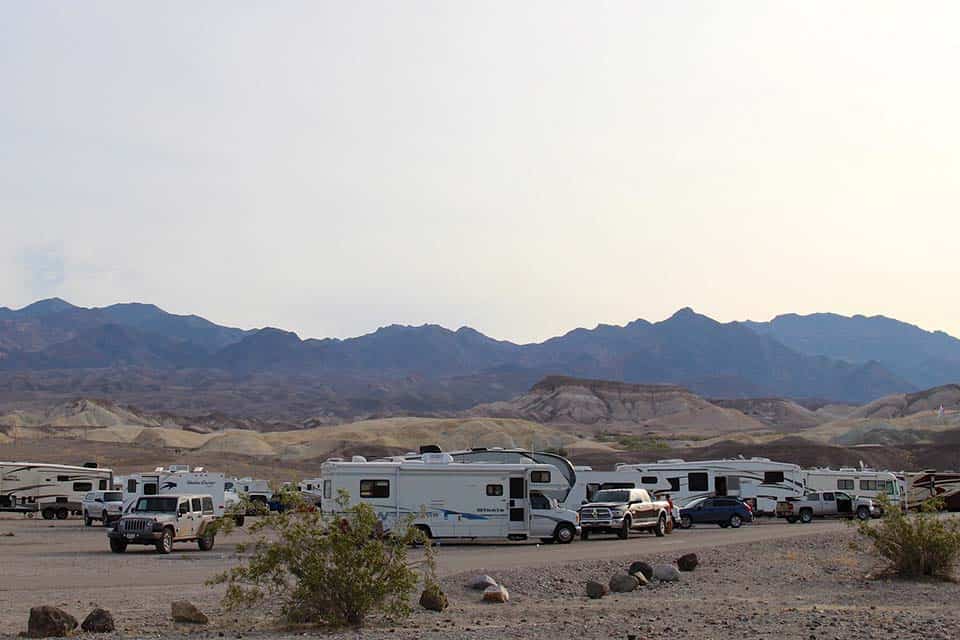
Why you should camp here: This centrally located gravel lot offers great overflow camping near all the main sights in Death Valley.
-
- Reservations accepted: No
- Best season: Spring, winter
- Campsite type: Tents, car camping, RVs
- RV hookups: None
Though not as scenic as the other campgrounds on this list (it’s essentially a large, gravel lot set right in the middle of the National Park), Sunset Campground is a great option for folks with vans or RVs who are planning a last-minute getaway on a holiday weekend or when there’s an awesome weather window during peak winter months.
Campsites here are simple and do not offer hookups, though there are restrooms with flush toilets and potable water stations set up around the area for your convenience.
Set right in the middle of all the action, Sunset Campground is walking distance to the restaurant and bar, the visitor center, and even Death Valley’s surreal, evergreen golf course. Hiking trails to the most popular sights are only a few minutes’ drive away.
We can’t recommend this campground campers planning to pitch a tent, but as Sunset is first-come, first-served and rarely fills up, it’s a quick and easy option for people who know they’re just going to pull in their trailer, van, car, or RV and simply sleep.
Keep your eyes peeled for daring coyotes that sometimes stumble into camp near sunset!
Related Read: 10 Rad Airbnbs Near Death Valley National Park, California
3. Texas Springs Campground
Why you should camp here: Ample facilities, wide campsites, and fantastic views of the colorful, surrounding bluffs make Texas Springs a great spot for last minute weekenders.
- Reservations accepted: No
- Best season: Spring, winter
- Campsite type: Tents, car camping, RVs
- RV hookups: No
Only a mile down the road from Furnace Creek proper lies the lovely Texas Springs Campground. Surrounded by the rainbow-striped bluffs that Death Valley is famous for, this first-come, first-served campground is only open during the park’s peak season, generally October 15th through May 1st.
Since reservations are not accepted here, it’s a fantastic first choice for weekenders or last minute campers who want a spot that’s central and has all the necessary amenities on site. All 92 campsites are well equipped with picnic tables and fire pits, while potable water and flush toilets are only a quick jaunt away. There’s also a dump station for RVers in need.
If you’re planning on tent camping, rejoice! The unique topography of Texas Springs allows for some foliage to grow, meaning that many of the tent sites found here will have a dollop of shade to escape the heat.
The location of this campground is phenomenal — right smack in the middle of everything Death Valley National Park is known for. Day hikers will marvel at landmarks like Zabriskie Point and Golden Canyon, and geology geeks can get up close and personal with Badwater Basin and the Devils Golf Course. Other high-profile attractions like the visitor’s center and Death Valley’s grassy golf course are also a short drive away.
Related Read: 6 Phenomenal Backpacking Trails in Joshua Tree National Park
4. Mesquite Spring Campground
Why you should camp here: Near the northeastern side of Death Valley National Park, this simple campground has magnificent mountain views, feathery green shrubs, and is open year-round.
- Reservations accepted: No
- Best season: Spring, fall, winter
- Campsite type: Tents, car camping, RVs
- RV hookups: No
Mesquite Spring Campground is a haven for campers looking to explore the northwest corner of Death Valley, offering 30 first-come, first-served campsites for those in tents, vans, or RVs up to 35 feet. The sites here are simple, with picnic tables, barbecue pits, and flush toilets that are only a few steps away. The pay box only accepts credit cards, so be sure to pack yours before heading out.
Potable water is ordinarily available at Mesquite Spring, but be sure to call the ranger station before you head out. From time to time, the water may be temporarily shut off.
Though the campground is one hour and 15 minutes from the hustle and bustle of Furnace Creek, it offers a more rustic camping experience for those looking to car camp with a much smaller and quieter crowd. It’s also set at an elevation of 1,800 feet above sea level, making it a much cooler option than the park’s southern campgrounds.
Make no mistake, though — there’s no shortage of things to do in this section of Death Valley. The Grapevine Ranger Station is a stone’s throw away, as are the Ubehebe Crater, Racetrack Playa, and Scotty’s Castle. For a truly spooky adventure, check out the eerily abandoned buildings of the Leadfield Ghost Town.
Related Read: 20 Incredible Hikes in Southern California
5. Stovepipe Wells Campground
Why you should camp here: Gaze up at the breathtaking view of the Mesquite Flat Sand Dunes and surrounding mountains from this large, 190-site mecca.
- Reservations accepted: No
- Best season: Spring, winter
- Campsite type: Tents, car camping, RVs
- RV hookups: No
Like many campgrounds in Death Valley National Park, Stovepipe Wells might look a lot like a large gravel parking lot at first glance, but this first-come, first-served area puts campers right next to one of Death Valley’s coolest attractions — the Mesquite Flat Sand Dunes.
Imagine waking up at sunrise and cruising over to the empty dunes to nab that perfect, glowing shot of the peaceful sand hills and neighboring craggy peaks beyond. That’s the magic of camping at Stovepipe Wells.
We recommend driving around this large, 190-site campground before nailing down your final selection, as not all tent sites here have fire pits and picnic tables. That’s fine if you’ve got a sweet van or large RV, but tenters will want to scour the area for that perfect spot. Potable water and flush toilets, on the other hand, are only a short stroll away from all the campsites.
For those looking for a more luxurious RV camping experience, a privately operated, 40-site RV park offers full hookups and is adjacent to the general store at Stovepipe Wells.
Due to extremely high temperatures (nighttime temps can be uncomfortably scorching in summer months), Stovepipe Wells is only open during peak season, generally from mid October to early May.
Though the dunes are the main attraction here, there is also a gas station and general store near Stovepipe, and the village surrounding Furnace Creek is only a 30-minute drive away. Many online reviewers are also fond of the cell service rumored to exist here.
Related Read: The 20 Best Places to Camp in Southern California
6. Emigrant Campground
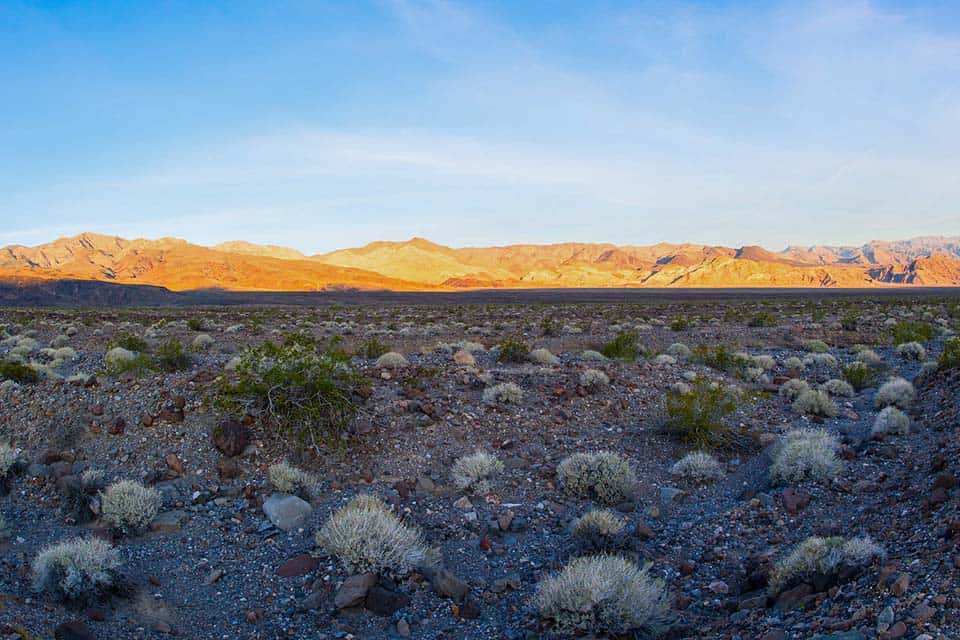
Why you should camp here: This primitive, tent-only campground is free to use and offers magnificent views of the Panamint Mountain Range and the outer corners of Death Valley National Park.
- Reservations accepted: No
- Best season: Spring, fall, winter
- Campsite type: Tents, car camping
- RV hookups: No
You won’t find any city luxuries, golf courses, or a general store at Death Valley’s Emigrant Campground, but that’s not what this spot is about. After crossing the imposing Panamint Mountains, this small, 10-site oasis appears out of nowhere, offering bathrooms with flush toilets, picnic tables, and potable water for the lucky souls who are able to grab one of these free sites.
The one down side is that, unfortunately, there and no fire pits, and fires are not allowed.
Set at an elevation of 2,100 feet above sea level, Emigrant Campground is considerably cooler than some of the more popular campgrounds near Furnace Creek. This makes it an excellent option for adventurers visiting during shoulder seasons, when temperatures are still blazing down below.
The mountain views here at sunset are nothing short of spectacular, and with the cooler temps you’ll actually be able to enjoy them!
Though the sites are little more than a rocky, gravel patch to place a tent, Emigrant is a lovely jumping-off point for smaller groups eager to explore Death Valley’s 3.4 million acres.
Related Read: 14 Epic Campgrounds Near Los Angeles, California
7. Wildrose Campground
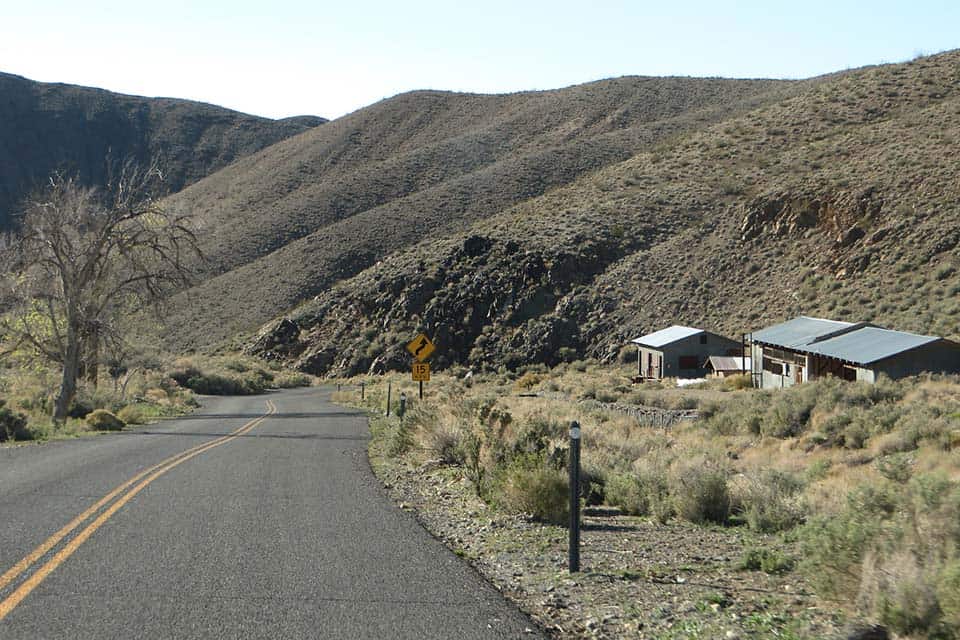
Why you should camp here: Escape the sweltering heat and get into Death Valley’s canyons at this rustic, free campground that’s open year-round.
- Reservations accepted: No
- Best season: Spring, fall, winter
- Campsite type: Tents, car camping, RVs (up to 25 feet)
- RV hookups: No
Located miles from civilization, down dusty Wildrose Road, this is a campground for those looking to truly get away from it all.
Wildrose Campground lies on the outer edge of Death Valley National Park, near the park’s highpoint, Telescope Peak. This 23-site retreat offers basic amenities like pit toilets, potable water, and sites with picnic tables and fire rings.
The best part? It’s free and open year-round.
Be sure to pack in your own firewood if you’re looking to set up camp here — there are no stores or trees for miles.
Wildrose is a gorgeous spot to take in the sunrise and sunset, free from the noise and crowds of Furnace Creek’s village-like atmosphere. It’s situated at an elevation of 4,100 feet, too, making it the highest (and coolest) campground in Death Valley that you can access with a 2WD vehicle.
Though the main tourist sights are about an hour’s drive away, Wildrose is close to a few wonders of its own. The Charcoal Kilns are just down the road, there are sand dunes only a few miles away, and adventurous hikers may fancy a leg-busting ascent of nearby Wildrose Peak to soak in some epic views of the Panamint Mountains.
Related Read: 9 Adventurous Things to Do in Yosemite National Park, California
8. Thorndike Campground
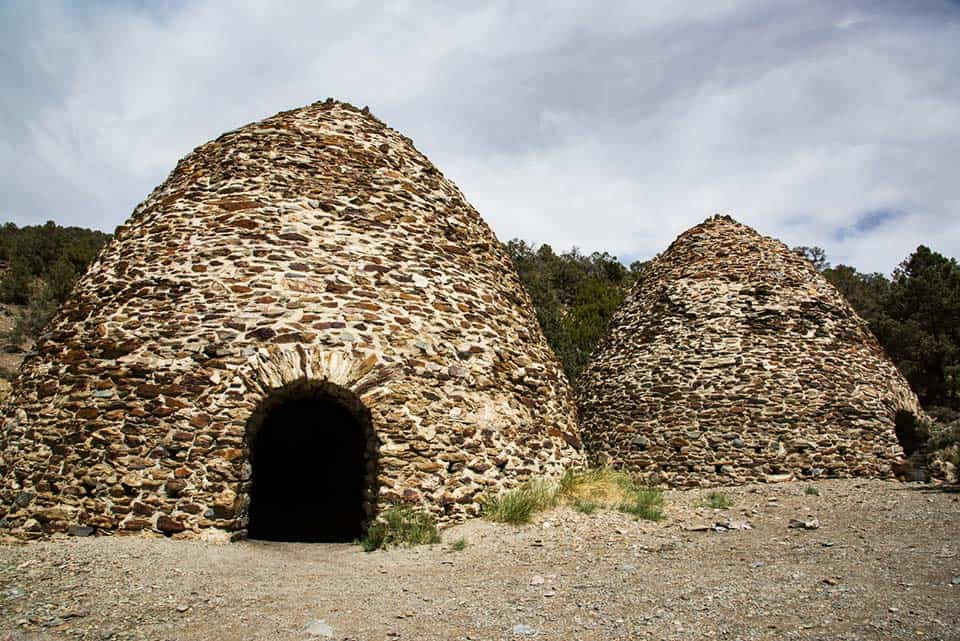
Why you should camp here: Find solace in the high desert and pitch your tent among the juniper and pinyon pine trees at this first-come, first-served mountain hideaway.
- Reservations accepted: No
- Best season: Spring, summer, fall
- Campsite type: Tents, car camping
- RV hookups: No
Trees in Death Valley? It sounds crazy, but at Thorndike Campground, you can beat the heat and set up camp in a shady grove of junipers and pinyon pines, nestled underneath the watchful shadow of the park’s highest point, Telescope Peak.
This rugged campground requires a high clearance vehicle to access it, and during inclement weather, 4-wheel drive may be necessary. The extra effort will be rewarded with secluded, shady campsites that are perfect for afternoon relaxing and hammock hang-outs.
Open March through November (depending on snowpack), campsites here are free to use and quite rustic, with picnic tables and fire rings available at each one. Pit toilets are available nearby. No potable water is provided by the Parks Service at the campground, so pack it in!
Though Thorndike Campground is an hour and a half’s drive from the big attractions at Furnace Creek, it offers a quiet, more mountainous version of what Death Valley has to offer and is walking distance to the park’s historic charcoal kilns. It’s also at an altitude of 7,400 feet above sea level, making it one of the few tolerable spots to spend the night during summer months.
Related Read: 11 Epic Winter Camping Spots in California
9. Mahogany Flat Campground
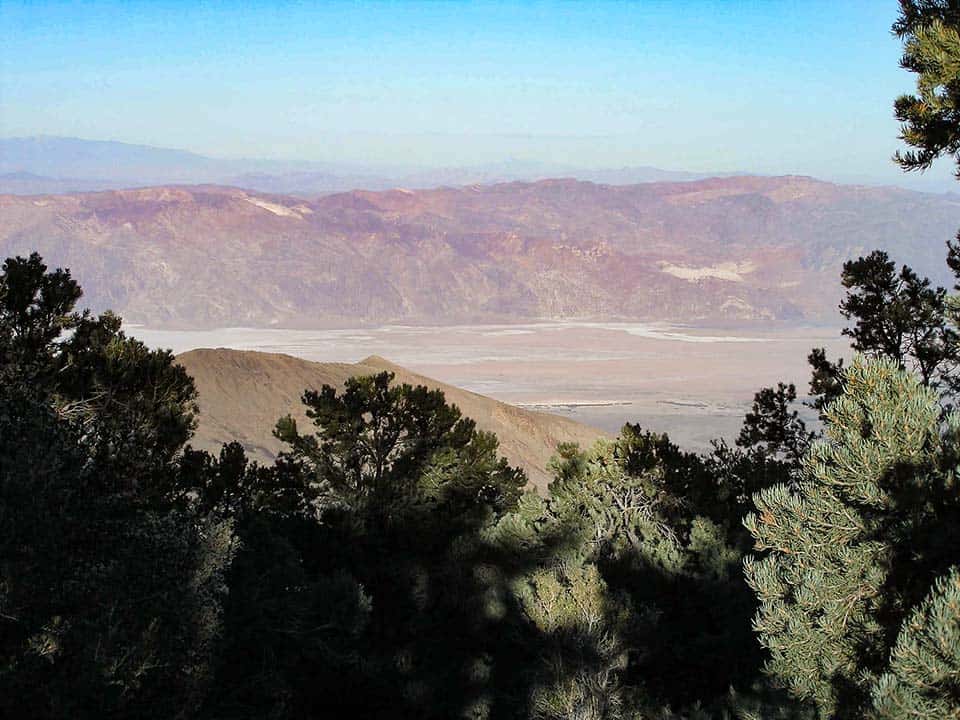
Why you should camp here: Perched on a high ridgeline, Mahogany Flat Campground offers peaceful, high-altitude campsites with killer views, far away from the heat and the crowds.
- Reservations accepted: No
- Best season: Spring, summer, fall
- Campsite type: Tents, car camping
- RV hookups: No
Though many consider it the prettiest campground in all of Death Valley National Park, Mahogany Flat Campground is not easy to get to. Visitors looking to bask in the spectacular sunsets, fragrant juniper trees, and stellar views of the valley floor will face a long climb up a road only suitable for high clearance vehicles.
This first-come, first-served primitive campground is free to use and typically open from March through November, depending on the year’s snow. Call the ranger station before setting out on your journey if you’re looking to camp at Mahogany Flat, as the campground itself is at 8,200 feet above sea level.
Like many campgrounds in Death Valley, Mahogany offers visitors picnic tables, pit toilets, trash cans, and fire rings, but it’s worth noting that there is no water in this area — potable or otherwise. Campers here must pack it in, and we recommend at least one gallon per person, per day.
Traditionally, Mahogany Flat is used as a base camp for burly hikers and mountaineers looking to ascend nearby Telescope Peak (11,043 feet), though a wealth of other hiking opportunities are also nearby. If you’re looking for a more casual workout, we recommend taking a stroll down to the antique charcoal kilns or taking the shorter trail up to the summit of Wildrose Peak.
Related Read: 9 Soak-Worthy Hot Springs in California
Private Campgrounds
10. Panamint Springs Resort
Why you should camp here: Located just inside the park’s western border, Panamint Springs Resort boasts fantastic views of the Panamint Mountains and offers tent cabins, car camping spots, and RV sites with full hookups.
- Reservations accepted: Yes
- Best season: Spring, fall, winter
- Campsite type: Tent, car camping, glamping, cabins, RVs
- RV hookups: Full
Panamint Springs Resort is the first sign of civilization most campers will find after a long drive through the arid desert on their way to Death Valley. It’s a great option for people ready to rest their weary heads after the drive or who want to explore the outer reaches of the park like Telescope Peak, Darwin Falls, and the stunning Father Crowley Overlook.
Once owned and operated by Buffalo Bill’s cousin (yes, really!), the resort was first opened in 1937 when a toll road was built to offer access into Panamint Valley.
Located just off the park’s main road, Highway 190, Panamint Springs is one of those quirky, “only in the desert” places with hilarious and strange bedding options like a newly-built tiny “miners cabin” and a 1950’s-era motel full of sparsely decorated rooms and a continental breakfast buffet. There’s a gas station across the street, and we recommend filling up here before venturing further into Death Valley.
For those looking to camp, the resort has tent cabins, 22 car camping sites, six full hookup sites, and 26 dry sites for RVs. Nearly all sites have fire rings and picnic tables, while showers and toilets are only a short walk from camp.
Unlike most NPS campgrounds nearby, reservations are available at the Panamint Springs Resort, making these funky desert campsites a great option for groups or those traveling from far away to marvel at the arid badlands of Death Valley.
Reserve NowRelated Read: 15 Best Glamping Spots in California for a Retreat from Civilization
11. Fiddlers’ Campground
Why you should camp here: Get access to the fabulous amenities of The Oasis at Death Valley at this village-like haven for vanlifers and RVers.
- Reservations accepted: Yes
- Best season: Spring, fall, winter
- Campsite type: Tents, car camping, RVs
- RV hookups: None
Fiddlers’ Campground is owned and operated by The Oasis at Death Valley Resort, which makes it a great fit for campers looking to save a bit of cash and still experience some of the luxurious amenities of the Furnace Creek area. Those who choose to lay their heads here will nab access to things like a shower facility, spring-fed swimming pool, shuffleboard, volleyball, bocce ball, a tennis court, and even a basketball court!
While many campsites here are shaded, others are little more than flat, gravel patches, making the campground best suited for those with vans or RVs that offer a little privacy. Communal fire pits are available nearby for nighttime camaraderie, and each individual site is equipped with a picnic table. It’s not the most affordable option in the area, but the amenities and advance reservations more than make up for that.
Fiddlers’ Campground is centrally located in the Furnace Creek area of Death Valley National Park, near the main visitor center. It’s a wonderful jumping off point for day hikes like Golden Canyon, Zabrieskie Point, and the Harmony Borax Works Interpretive Trail.
Reserve NowMore California Camping Spots
Sign up for the Weekend Wanderer to join thousands of readers getting epic travel, hiking, camping and gear ideas every week.
Seen in: California, Camping, Death Valley, National Parks, West


